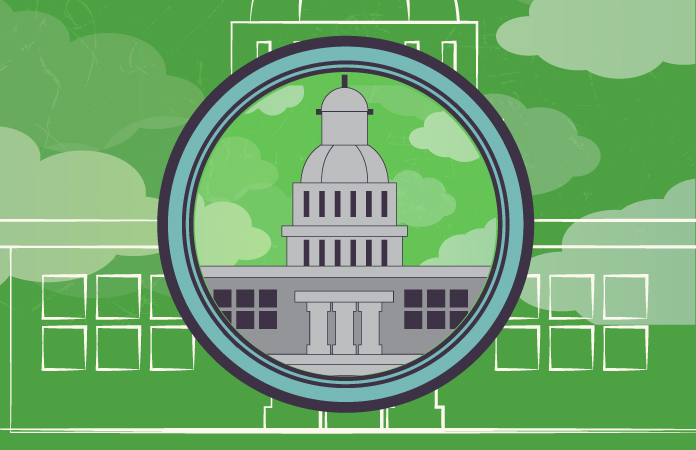

The Colorado General Assembly introduced 25 bills in the last week which address a wide range of issues.
Some of the standouts include two bills on medical billing practices, including one that would prevent debt collection by hospitals that are out of compliance with federal price transparency law. Another bill would create a $40 million fund to incentivize developers to build more affordable housing in the state. Plus, a bill with a long list of proposed regulations for the state’s marijuana industry including a searchable database of license violations, twice-annual compliance checks for all dispensaries, an annual report on license violations, black and gray market investigations and more.
House Bill 1282 — Affordable Housing Incentive Program
Description: Affordable Housing Incentive Program
Sponsors: Sen. Bridges (D), Sen. Woodward (R), Rep. Mullica (D), Rep. Lynch (R)
Summary: This bill would create a $40 million innovative housing incentive program within the office of economic development that would give grants to Colorado businesses building certain types of housing. Grants could cover capital operating expenses and would incentivize the creation of units with certain criteria made by the office of economic development including affordability, location, where the unit is installed or energy efficiency standards. The bill hopes to address “a lack of affordable housing at critical levels” across the state and was created in connection with a General Assembly subcommittee created last year to address housing in Colorado.
Senate Bill 149 — Marijuana Industry Regulations for Underage Sale Violations, Reports, Product Recalls and More
Description: New Marijuana Industry Regulations for Underage Sale Violations, Reports, Product Recalls and More
Sponsors: Sen. Priola (R), Sen. Hansen (D), Rep. Amabile (D), Rep. Lynch (R)
Summary: This bill adds regulations to Colorado’s marijuana industry. It would require future contracts for seed-to-sale tracking to be awarded with a transparent, online and competitive process. It also requires the state licensing authority to produce annual reports about its enforcement activities. The reports would include the number or underage compliance checks performed; the number of underage sales violations found and details about those violations; and a description of black market and gray market (sales that combine illegal activities with legal, regulated marijuana such as knowingly selling more than the daily legal amount of marijuana to one person) enforcement activities and details about enforcement. The bill further requires the licensing authority to host a free, searchable database on its website with compliance check records, underage possession records and a way to submit an online tip about license violations. The licensing authority would need to conduct at least two compliance checks every year at every retail and medical dispensary and would base penalties for underage sale violations on the number or violations a licenser has had and any injuries that were the result of an underage sale. The bill would also task the state licensing agency with creating rules around product recalls and notifying someone of a license violation. The agency would need to create a representative work group to come up with these rules which would include members from outside of the marijuana industry.
Senate Bill 152 — Voting Address After a Home is Hit by Natural Disaster
Description: Voting Address After a Home is Hit by Natural Disaster
Sponsors: Sen. Fenberg (D), Sen. Jaquez Lewis (D)
Summary: If someone’s home is destroyed or made uninhabitable by a natural disaster, they could keep their residency for the purpose of voting at the location if they plan to return once the home is replaced or fixed. Their state residence for vehicle registration or income taxes wouldn’t need to match their voting address.
House Bill 1287 — Protections for Mobile Home Lot Tenants
Description: Protections for Mobile Home Tenants
Sponsors: Rep. Boesenecker (D), Rep. Hooton (D)
Summary: This bill would amend Colorado’s Mobile Home Park Act and the dispute resolution and enforcement program. The bill would limit how much a landlord can raise rent on a mobile home lot based on inflation, clarify and change rules around when landlords plan to sell a park, set out enforcement and investigation protocols and more.
House Bill 1284 — Updates to State Surprise Billing Laws
Description: Updates to State Surprise Billing Laws
Sponsors: Sen. Gardner (R), Sen. Pettersen (D), Rep. Esgar (D), Rep. Catlin (R)
Summary: This bill would change state law to align with the federal “No Surprises Act” which regulates medical billing. The updates would require insurance to cover emergency care and services by out-of-network providers with in-network benefits, allow insured patients to request external review of healthcare coverage decisions to determine if a service by an out-of-network provider could be covered with in-network benefit coverage and more.
House Bill 1285 — Debt Collection Block for Hospitals Out of Compliance with Transparency Laws
Description: Debt Collection Block for Hospitals Out of Compliance with Transparency Laws
Sponsors: Sen. Moreno (D), Sen. Cooke (R), Rep. Neville (R), Rep. Esgar (D)
Summary: Hospitals that aren’t compliant with federal laws over price transparency would be prevented from collecting debt incurred by patients during dates when the hospital was out of compliance. Attempts to collect debt in these cases would be classified as an unfair practice under the Colorado Fair Debt Collections Act. The bill doesn’t prevent hospitals from billing patients or insurance for services and doesn’t require hospitals to refund payments for services. But, a hospital that attempts to collect debt as prohibited would be subject to a penalty equal to the debt, would have to refund any payments made toward the debt and pay for attorney’s fees and costs. The Colorado Department of Public Health and Environment would be allowed to consider compliance with federal price transparency laws in hospital license renewal applications.


